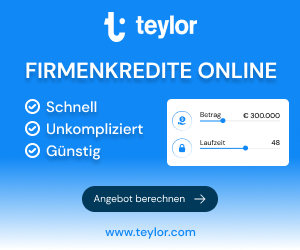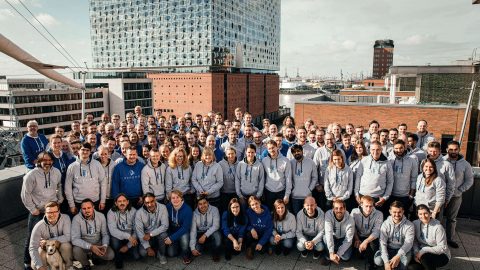
crowdfunding.de: Seedrs just opened an office in Germany. What are your plans for this region?
Beatrice Werdin: We have been really impressed by what we have seen of the entrepreneurial ecosystem in the DACH region and Berlin is undoubtedly one Europe’s leading entrepreneurial hubs. We want to help local entrepreneurs on the ground to scale their businesses Europe-wide at least. We aim Seedrs to become a key player in providing finance to startups and growth-focused ventures in the DACH region and are excited about starting to work closely with some inspiring local entrepreneurs!
Is Seedrs accessible for startups and investors from Germany?
Kyrill Zlobenko: At Seedrs we have always had a pan-European vision for the platform and as such, Seedrs has long accepted investors and entrepreneurs from outside the UK. To date we have had only a handful of German campaigns live on the site but with the launch of our representative office in Berlin we definitely want to change this. We believe it’s important to be physically present here, to speak with the local entrepreneurs, “keep our finger on the pulse” – simply to understand better, how we at Seedrs can help the entrepreneurs from the German speaking markets succeed with their ventures on a global level.
Does the German regulation (Kleinanlegerschutzgesetz) apply for Seedrs?
Beatrice Werdin: Seedrs is authorised and regulated by the UK Financial Conduct Authority (the equivalent to the German BaFin) and it was the first equity crowdfunding platform in the world to gain regulatory approval. The advantage of European Union membership is that Seedrs can now take advantage of the incredibly advanced regulation in the UK and use the same model for companies registered in Germany under the “passporting” regulations as applied to financial services.
Seedrs will not be looking at structuring any investments into German companies as a “partiarische Nachrangdarlehen” (basically, a loan to the business). As a result, German investors have the opportunity to purchase equity in German and European businesses they believe in, receiving voting shares and use professional-grade subscription agreements. This ensures German investors finally get the same level of protection that larger angel investors and venture capitalists enjoy since a long time.
If you compare market sizes in UK and Germany, crowdfunding in UK seems to be more advanced. What are the reasons?
Beatrice Werdin: One of the key reasons is certainly the introduction of the Seed Enterprise Investment Scheme (SEIS) in 2012. The scheme is designed to help small and early-stage companies to attract private investment by offering generous tax reliefs to individual investors who purchase new shares in eligible companies. It offers both income tax (up to 50% of the cost of the shares) as well as capital gains tax relief to qualifying investors.
With regards to the prospectus directive that applies to all public offers of securities in the EU, the UK has implemented a higher threshold (€5 million) under which they don’t need a prospectus than other member states, including Germany. As a result, we’ve seen established and later-stage companies raising much larger rounds than the average seed round via equity crowdfunding in the UK in the past two years.
From an UK perspective, what is your perception of crowdfunding in Germany?
Kyrill Zlobenko: Crowdfunding in Germany has a good history! The fact that you have the domain crowdfunding.de since 2007 already speaks for itself :-). Germany has everything that makes the crowdfunding community vital: investors, their interest, amazing startups and local success stories, regulators that are supportive and great platforms/players in the crowdfunding space with their first exits.
There are some great players in the German market, and we’re not looking to compete with them on fully German deals — if you are a German company looking solely for German investors, and you want to do things under German law using German language, we’re probably not for you. But if you’re a Germany company looking to draw capital from across Europe, and get the connection and support that come from an international investor base, then we offer something different from the local players.
What is the attitude of the classical VC industry in UK towards crowdfunding?
Jeff Lynn: We’ve had a very interesting experience with VCs, which is that almost to a number, they start out skeptical but then become very supportive once they work with us. In principle VCs are usually happy with the idea of their companies crowdfunding — it’s more capital for the companies to grow, along with a strong commercial bonus in having lots of supporters — but I think they often expect that we’ll be an amateur operation that won’t know how to handle legal documents, payments etc. When they see that we are actually highly professional (and in many cases better at the mechanics than they are!), they tend to be very happy to work with us.
How does a typical investor at Seedrs looks like?
Jeff Lynn: We have a wide range of investors, from students making their very first investments to „silver surfers“ who are captivated by all the possibilities that the Internet brings. But our archetypal investor is in his 30s or 40s and working in a professional-level job (professional/finance services, corporate management, running a small business, civil service, etc.), well-paid but not ultra-rich, and largely living in or near major cities.
From your experience, what is the most important advice for startups that seek for funding from the crowd?
Kyrill Zlobenko: One common thing that we see that businesses underestimate heavily is: building the loyal community in advance – weeks and sometimes even months before the crowdfunding campaign will kick off. Yes, there is certainly some “magic” that happens when you actually push the “start” button and go live, but communicating your story in advance to your crowd, your community, your supporters is an absolute must! Another important thing that helps to determine a successful campaign even before the public launch is an entrepreneur’s attitude and focus. We think that Thomas Watson, former CEO of IBM has said it just right: “To be successful, you have to have your heart in your business, and your business in your heart.”
Thank you for the interview!






Kommentare
Die E-Mail-Adresse wird nicht veröffentlicht. Erforderliche Felder sind mit * markiert. Infos zum Datenschutz.